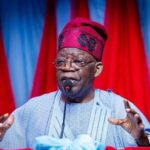Despite the ongoing economic struggles in the country, Tinubu and Cardoso still went on to declare the ambition of making Nigeria a one-trillion-dollar economy within three years. I still need to figure out the rationale behind this declaration, but I reckon many of you will be thinking like me: that this government needs to keep their ambitions close to reality.
To be fair, it was the President who projected that we would become a trillion-dollar economy in three years. The CBN Governor was conservative about it, saying it could happen in eight years. He probably said so, in contradiction to the President’s projection, because he was speaking at the sidelines of the 2023 World Bank/IMF Annual Meetings in Morocco. Such places usually have people who can tell reality from fantasy quickly.
Basically, they are saying that the country’s 2022 GDP, $477 billion, will at least double within the years they projected. Experts who were listening to Cardoso would have carried their calculators to make a quick check by using the rule of 70. The rule of 70 is a straightforward method to estimate the number of years it will take for the GDP to double, given its annual growth rate. It is calculated by dividing 70 by the annual percentage growth rate. In this instance, all you need to do is divide 70 by 8 to know the growth rate required for Nigeria to double its in eight years, which is 8.75 per cent. This means Nigeria must grow at an average rate of 8.75 per cent for eight years to double its 2022 GDP.
The last time Nigeria achieved such a growth rate was in 2004 and 2002, since the return of democracy. Before then, it was only in 1990, five times during the 1970s oil boom and in 1963. So, any right-thinking person, including the policymakers themselves, will debunk this projection as mere fantasies. But the policymakers are allowed to dream.
SEC backs $1trn economy target, infrastructure financing
Insecurity on the loose in North — Don
Speaking of dreams and debunking, Cardoso went on to contradict himself when he spoke to Reuters by saying the CBN does not have a “magic wand” to address the current economic challenges in the country. Of course, people disagreed with him because the CBN data shows Cardoso is still utilising the CBN’s ‘magic money tree’ to inject more money into the economy amid headline inflation and Naira devaluation.
Specifically, the total money supply (M2) grew to N66.4 trillion in September from N65.15 trillion recorded in August 2023, when he was confirmed as Governor. One expects him to argue the money supply is to stimulate the growth he projected, but he did not. His statements should match the publicly available data people use to make projections about the country. Not doing so creates more uncertainty in the economy.
Similarly, the National Security Adviser, who advises the president on national security issues, went to the media to restate that this government inherited a ‘bankrupt economy’ from Buhari. I am still determining the clear intent of Ribadu’s statement, but it has an unintended meaning: that Nigeria needs investments from other sources to achieve its desired growth target. The Minister of Finance, tasked with steering the fiscal policy, also went on to support this statement at the Senate Joint Committee that was scrutinising the medium-term expenditure framework and fiscal strategy paper (MTEF/FSP). He went on to affirm the impracticality of continued borrowing given the economic state of the country. He also acknowledged that the economy could be more attractive to investors.
Edun’s stance aligns with conventional economic wisdom, which suggests that excessive reliance on debt can lead to unsustainable fiscal deficits and economic instability. It reflects a growing awareness of the need for fiscal prudence in an economy already burdened with high levels of debt.
On the contrary, the Minister’s actions to request a series of loan approvals from the Senate and a previous statement in Morocco about applying for a $1.5 billion concessionary loan from the World Bank to support budget funding contradicts his stance. Surprisingly, the Senate had rubber-stamped a $7.8 billion and another €100 million borrowing a few days before the scrutiny.
However, the lawmakers did not deem it relevant to scrutinise the policymaker’s inconsistencies. This change of position is not just a minor policy flip-flop; it is a demonstration of how inconsistent fiscal strategy impacts the economy in the short, medium and long term. These conflicting signals are problematic for the growth the government desires.
So, knowing that making a trillion-dollar economy within eight years is difficult to achieve, the government should still make efforts to be on the trajectory to achieve it. They should start by creating economic confidence through consistent and clear fiscal policies. That means all policymakers’ statements must match their actions. They should stop confusing those who are putting efforts into supporting the government’s approach to fiscal management, as that will have implications for investor confidence.
These mixed messages from the fiscal and monetary policymakers would only deter potential investors who are cautious of policy unpredictability and its implications for economic stability. Besides, it is their credibility and integrity that proves their level of competence.

 Join Daily Trust WhatsApp Community For Quick Access To News and Happenings Around You.
Join Daily Trust WhatsApp Community For Quick Access To News and Happenings Around You.
